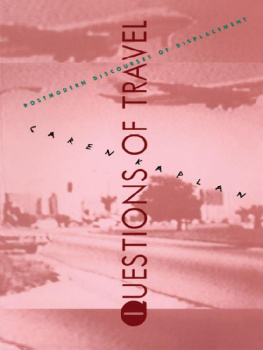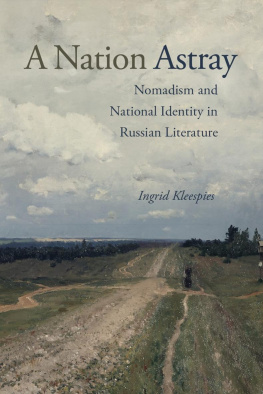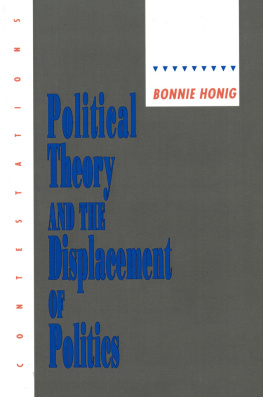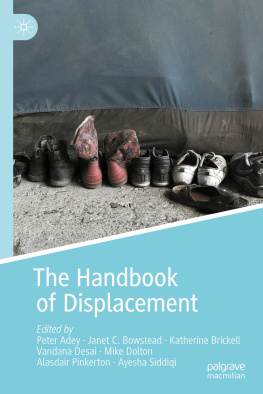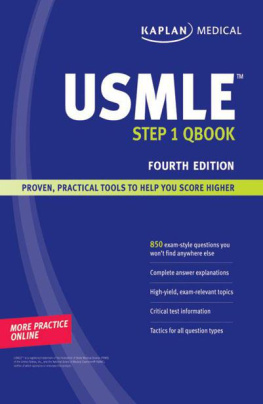PREFACE
For most of my life, travel has been a certainty rather than a question. I grew up in the state of Maine where the license plates read Vacationland and the tourists came and went in seasonal waves. And I have been a tourist myself often enough, looking for some relief from the rooted realities of dailiness. But just as important, I grew up with a sense of my family in dispersal across the terrains of the centurys immigrations. We had family in Argentina whom we no longer knew how to contact and we had relatives in touch by letter from South Africa and Israel. Always implicit in family narratives but rarely mentioned were the ones who stayed behind in Eastern Europe, now scattered beyond the reach of memory or communications. In the United States we had relatives spread across the continentin Chicago, Minneapolis, Tucson, Baltimore, and lots of other places; people who gradually lost touch or moved away again. Our closest relatives lived in Boston and New York, ensuring that we made the long drive down (before superhighways) from our ethnic exile way up north to the big metropolitan centers. Travel was unavoidable, indisputable, and always necessary for family, love, and friendship as well as work.
I was also born into a culture that took the national benefits of travel for granted, although in the span of my childhood and adolescence that certainty about the right of U.S. citizens to visit, invade, and invest in any location came under fire. Goodwill ambassadors or imperialists? The calls for Yankees to go home increased and continued to press for an end to U.S. military and economic adventures abroad. Couldnt U.S. citizens travel anywhere they pleased and be assured of a warm welcome? In Istanbul in 1972, as a participant in a liberal student exchange program, I was stunned when I was told We like you but we dont like your government or your military bases. Military bases? Thus, my education proceeded like that of many people of my class and race and generation; as I learned the difference between official and unofficial stories, I learned that knowledges are invested with social relations, histories, and struggles for representation.
I already knew this lesson from the disjuncture of gender socialization and my generations fledgling feminist resistance. Like lots of young white people entering what we called the counterculture, I was learning these lessons through the history of genocides of native American Indians and the enslavement of Africans. Much of this education was based on naive romanticizations and exoticizations, representational legacies that resounded in some aspects of the antiwar movement and many of the so-called new social movements. How to avoid these kinds of objectifications? How to make political coalitions based on material histories rather than mystified fantasies? How to deconstruct the privileges of race, class, and gender supremacy in the United States and rearticulate identities and alliances? This is work that elite and relatively empowered groups and subjects must engage in continually in order to be credible participants in social change.
In my case, asking questions about travel reinforces these lessons. Like most moderns in the West, I was brought up to believe that distance gives needed perspective, that difference leads to insight, and that travel is quite figuratively broadening. Yet it has also been my experience that travel can be confusing, distance can be illusory, and difference depends very much on ones point of view. Thus travel has not only provoked my questioning of official histories and ideologies (U.S. military bases in Turkey? Why?), but it has produced a profound skepticism toward the terms in which travel is described. Are imperialist travelers descriptions of cultural differences the ones we want to reproduce in tourist brochures? Who benefits and who suffers from the attitude that distance is the best perspective? As telecommunications and new technologies refigure our sense of distance and travel, why do older ideological formations persist, or in what ways do they shift?
Teaching about travel from this standpoint has helped me come to grips with the pervasiveness of metaphors of travel and displacement in contemporary culture in this country. So many of us desire to travel for fun or for education, even as many of us feel ambivalent about the mobile nature of employment and family organization. How do we sort out these perceptions of travel and come to understand the ways in which they are linked to a more postmodern moment of destabilized nation-states, cultural and economic diasporas, and increasing disparities of wealth and power? You have ruined my next vacation! some students complain. But most of the young people with whom I have discussed these ideas at both Georgetown University and UC Berkeley have embraced this project with insightful enthusiasm, and their rigorous questions and innovative readings have greatly aided my studies of this topic.
Questioning travel can be done on many registers and across many disciplines. The contours of this particular study were probably set in my undergraduate and graduate work at institutions that were engaged in pedagogical and curricular experiments and where I was encouraged to mix disciplines and methods to address the questions I was learning to pose. I am especially grateful to two of my professors at Hampshire College for giving me invaluable critical tools. Lester Mazor taught me to read closely and rigorously, to integrate teaching with learning, and, in the best anarchist tradition, to question authority. Jill Lewis opened up the world of feminist scholarship to me and provided an example of independence of mind that changed the way I imagined my future. They both gave me a strong sense of how to be radical critics and passionate teachers in conservative times. I could never have grown up to write this book without their faith and care.
I also found educational innovation in the History of Consciousness program at UC Santa Cruz where Hayden White, James Clifford, and Donna Haraway knocked my philosophical socks off, as it were. I am grateful to all three of them for teaching me how to question master narratives (and minor ones, too) and for training me to enter this profession. I must also thank Teresa de Lauretis, Robert Meister, Helene Moglen, Vivian Sobchak, Billie Harris, and Peter Euben, who supported, advised, and worked with me at various times at UCSC. My fellow students were among my best teachers; in particular, I thank Che Sandoval, Katie King, Lata Mani, Ruth Frankenberg, Deborah Gordon, Zoe Sofoulis, Lisa Bloom, and Gloria Watkins. I would like to acknowledge my dissertation chair, James Clifford, who never failed to provide me with things to read and think about that changed the way I approached my work. His patience and generosity continue to sustain me even as the depth and erudition of his own work provide a constant inspiration.
My own desire to travel and, perhaps, to emulate the conventions of modernist expatriation led me to spend two years in Paris after my advancement to candidacy. There I switched gears, learned the language a bit, and did the poststructuralist rounds at the various campuses. This book is deeply influenced by the kindness of those professors who admitted me to their seminars and lectures. The kindest and warmest welcome was extended to me by Sarah Kofman. When I was quite overwhelmed by my own displacement, she made me feel at home as a feminist critic.

